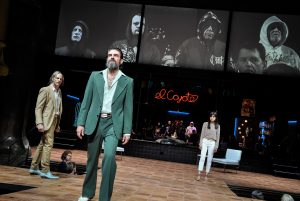First published in 1995, “The Tortilla Curtain” (German title: “América“) by T.C. Boyle deals with the conflict between cultures and values. The first conflict targeted by the author is the paranoid fear of Southern Californian suburbanites of being overrun by illegal immigrants from Mexico . The novel exposes the human primal fear which take over in view of imaginary threats, switching rational liberals to panic-driven xenophobes. Another conflict occurs with nature, as humans push more and more into the wild countryside, trying to retain a highly regulated environment.

Courtesy of Arno Declair.
When Stefan Pucher first considered adapting “The Tortilla Curtain” for the Kammerspiele, the movement of refugees in Europe had not yet reached the headlines. After 2015, however, the question of how to handle the exodus of several million people has lead to severe conflicts within the EU, whilst U. S. President Trump is intent on building a wall between the U. S. and Mexico to stop illegal immigrants from entering the U. S. Pucher’s adaptation, which premiered on 12th May, 2016 at the Kammerspiele, could not be more timely or relevant.
Delaney Mossbacher (Jan Bluthardt) and his wife Kyra (Wiebke Puls) have moved from the east coast to the luxuriously secluded Arroyo Blanco Estates bordering on the Topanga State Park, high above Los Angeles. Delaney is a nature writer and liberal thinker, his wife is a high-powered real estate broker. Their peaceful existence is suddenly disturbed when Delaney has a car accident, injuring a Mexican immigrant, Cándido Rincón (Gonzalo Cunill). To Delaney’s relief, the victim, who does not speak any English, does not want medical attention or the police. He accepts twenty dollars from Delaney and struggles to his makeshift shelter on the floor of the ravine below, where his pregnant wife América (Sylvana Seddig) waits for him to return. Cándido and América are illegal immigrants, trying to escape from poverty.
As the Mexicans work hard to escape their miserable existence in the ravine before their child is born, Delaney and Kyra gradually become drawn into projects to keep poor Mexicans away from their area. Their first step is the erection of a gate to keep the sight and presence of less desirable members of the public out of their development. As petty crime and graffiti occur more frequently, the community insists on building a wall. Delaney is opposed to this plan as he does not consider the Mexicans a problem, he is far more concerned with the coyotes who are lured onto private properties by people who feed them and pose a threat to little dogs and other pets.
Stefan Pucher interweaves the story of Cándido and América with the Mossbachers’, using the shifting perspectives to show us the view of life from both sides of this cultural and material divide. The stage design by Barbara Ehnes exacerbates the divide by placing the Mexican couple behind a glass wall, resembling a diorama in a natural history museum. Having them locked up safely in a display case is meant to enable us to distance ourselves from the misery and suffering of Cándido and América. They speak only Spanish, or English when discussing their life story in a future interview that is projected onto a screen above the display cases. There is also the occasional song about their suffering and their feelings for each other, which helps to make their tragedy more palpable.
Although the subject matter is so timely and could easily be transferred into the here and now, Pucher’s production is firmly anchored in the year 1995 by Annabelle Witt‘s garish costumes – Hawaiian shirts and suits in pink or turquoise – and a monologue listing some of the major German news items twenty-two years ago.
América is for the most part an intriguing multi-media production with great performances by Sylvana Seddig and Gonzalo Cunill as the ill-fated Mexican couple. Jan Bluthardt convinces as the liberal-minded Delaney Mossbacher but there is little Wiebke Puls can do with the overwrought Kyra who has the depth of a sitcom character. Peter Brombacher is seductively manipulative as Jack Jardine but the other characters remain redneck clichés with cowboy hats and enormous belt buckles. Yet after a strong first half, the second half becomes somewhat slow paced and text heavy. A highly relevant and poignant work despite its weaknesses. 4/5
Review written by Carolin Kopplin
AMÉRICA will next be shown on Monday 27th November 2017. For more information on the production, visit here…
The production is in German, English and Spanish with English surtitles.


Leave a Comment